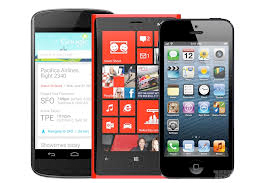I’ve written before about just how widespread mobile phones are: more people use mobile phones that a a toothbrush and more know how to use one than to use a pencil to write. This all happened very recently. I bet if you are asked when you got your first mobile phone you will guess too early. I had a car-phone in 1993 and a real mobile phone around 1996. By then I was working in the planning group for cellular phones and I was almost obligated to have the latest Ericsson phone…they were our biggest customer, up to 40% of total revenue for a single high-volume chip. Anyway, I wasn’t going to show up with a Motorola handset. In that era, in the business, handsets were called ‘terminals’ and several companies had divisions that used that word. But it wasn’t exactly consumer facing and morphed into different words in different countries: handset, mobile, handy, cell, and more.
iPhone is the most successful consumer launch…ever. Compared to say PCs or television, the ramp is much steeper. And when I say iPhone, I mean iPhone. If you want to look at the whole smartphone market it is even more incredible, mostly due to Samsung who are the other significant player in the market, but recently lots of low-cost Chinese suppliers too, many enabled by MediaTek’s chipsets.
How do iPhone sales stack up:
- Apple or Boeing vs iPhone? Apple
- Proctor and Gamble verus iPhone? Apple
- Coca Cola and McDonalds…combined vs iPhone? Apple
OK, so you probably assumed that those above results were for Apple. No, just iPhone. There is another half of Apple that is not iPhone: iPods, iTunes, MacBooks and more. Nobody seems to know this but Apple isn’t just bigger than Microsoft, iPhone alone is…or the rest of Apple. When you are twice as big you have two bits that are bigger.
So want to know some more amazing statistics: iPhone (not the whole of Apple) has revenue bigger than the turnover of the top 474 of the Fortune 500 (the top ones are mostly oil companies). Or all the non-bank companies on the London FTSE. Mobile is unbelievable large. It is the size of automotive but grew in a dozen years instead of a century. It is also very concentrated. Last time I looked, Apple and Samsung made over 100% of the profits in mobile. Meaning everyone else in aggregate lost money.
Google dominate market share with Android but since it is free it is hard to know how much money they make. But one theory is that by being ubiquitous they get all the consumer data that the networks do at a fraction of the price of building a network. We’ll see. In China there are lots of Android phones with no Google Apps: Baidu, Alibaba, QQ and all those Chinese alternatives.
More articles by Paul McLellan…








A Century of Miracles: From the FET’s Inception to the Horizons Ahead